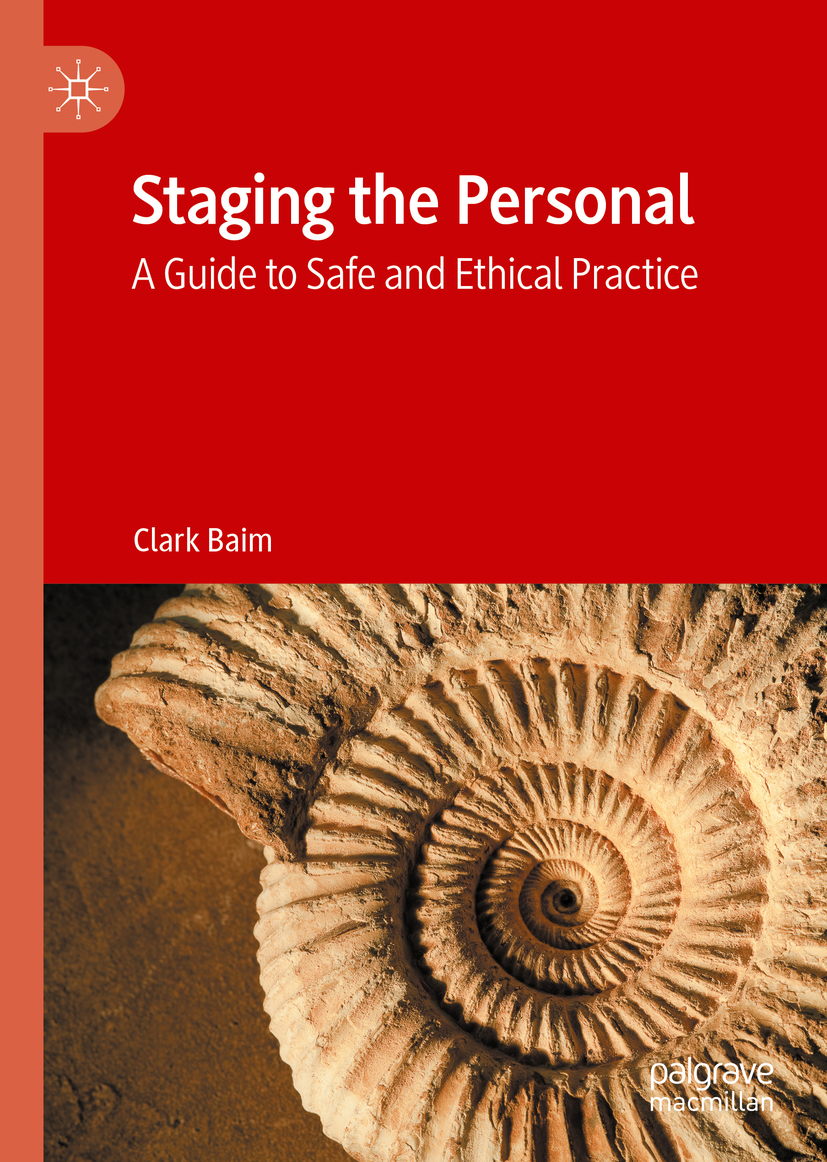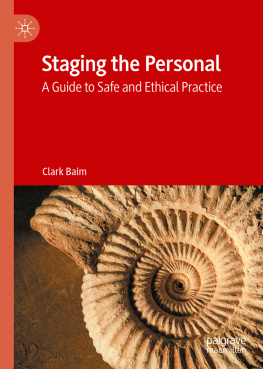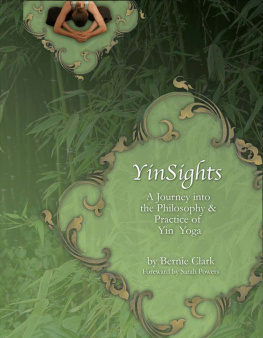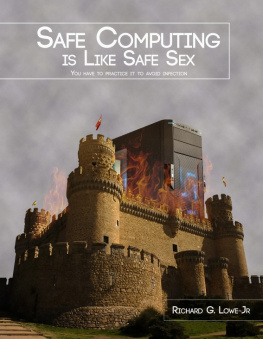Clark Baim - Staging the Personal: A Guide to Safe and Ethical Practice
Here you can read online Clark Baim - Staging the Personal: A Guide to Safe and Ethical Practice full text of the book (entire story) in english for free. Download pdf and epub, get meaning, cover and reviews about this ebook. publisher: Springer International Publishing, genre: Romance novel. Description of the work, (preface) as well as reviews are available. Best literature library LitArk.com created for fans of good reading and offers a wide selection of genres:
Romance novel
Science fiction
Adventure
Detective
Science
History
Home and family
Prose
Art
Politics
Computer
Non-fiction
Religion
Business
Children
Humor
Choose a favorite category and find really read worthwhile books. Enjoy immersion in the world of imagination, feel the emotions of the characters or learn something new for yourself, make an fascinating discovery.
- Book:Staging the Personal: A Guide to Safe and Ethical Practice
- Author:
- Publisher:Springer International Publishing
- Genre:
- Rating:4 / 5
- Favourites:Add to favourites
- Your mark:
- 80
- 1
- 2
- 3
- 4
- 5
Staging the Personal: A Guide to Safe and Ethical Practice: summary, description and annotation
We offer to read an annotation, description, summary or preface (depends on what the author of the book "Staging the Personal: A Guide to Safe and Ethical Practice" wrote himself). If you haven't found the necessary information about the book — write in the comments, we will try to find it.
Clark Baim: author's other books
Who wrote Staging the Personal: A Guide to Safe and Ethical Practice? Find out the surname, the name of the author of the book and a list of all author's works by series.
Staging the Personal: A Guide to Safe and Ethical Practice — read online for free the complete book (whole text) full work
Below is the text of the book, divided by pages. System saving the place of the last page read, allows you to conveniently read the book "Staging the Personal: A Guide to Safe and Ethical Practice" online for free, without having to search again every time where you left off. Put a bookmark, and you can go to the page where you finished reading at any time.
Font size:
Interval:
Bookmark:


Anyka / Alamy Stock Photo
This Palgrave Macmillan imprint is published by the registered company Springer Nature Switzerland AG.
The registered company address is: Gewerbestrasse 11, 6330 Cham, Switzerland
Staging the Personal brings into sharp relief the ethics of creating theatre from personal stories. Charting the rise of practice that blurs the boundaries between theatre and therapy, the book offers us the Drama Spirala superb practical tool for practitioners navigating the often risky terrain of personal disclosure, exposure, and vulnerability.
Alice OGrady, Professor in Applied Performance, School of Performance and Cultural Industries, University of Leeds, UK
Clark Baim is one of the most inspirational theatre facilitators working in the world today. Drawing from a long history of working in prisons with Geese Theatre, and then subsequently in his own psychodrama practice, the book meticulously details an ethics of care about staging personal lives on the stage or in a drama workshop. Baim argues for a robust framework for safe, flexible and intentional practice that unpacks a facilitators intuition into a carefully constructed approach. At the heart of this book is the presentation and description of the Drama Spirala thoroughly useful model applicable to diverse theatre practicesthat deserves a key place in how we conceive of and facilitate work with participants real stories.
Michael Balfour, Professor of Theatre and Performance, School of the Arts and Media, University of New South Wales, Sydney, Australia
Clark Baim combines both his expert theoretical knowledge and practical experience as a psychodramatist and drama facilitator to explore the risks of using real peoples stories in theatre making. In doing so he offers the Drama Spirala timely and vital methodology for navigating safe and ethical practice when staging personal stories that should be compulsory reading for theatre makers everywhere.
Dr Selina Busby, Course Leader MA Applied Theatre, The Royal Central School of Speech and Drama, University of London, UK
The theater of personal stories provides unique opportunities for performers and spectators to experience the power of narrative through performance. Personal stories have the strength to galvanise socio-political movements, advocate on behalf of others, educate, raise awareness, and support therapeutic processes. Yet, without appropriate safeguards and training, theater practitioners can, albeit unintentionally, expose, exploit, and ultimately harm participants, performers, and spectators alike. This pioneering book is, therefore, urgently needed. It provides theater practitioners with a theory-driven pragmatic framework with which to support their practice using clear ethical guidance. This book is a joy to read and an essential tool for theater practitioners, students, scholars, and researchers working in this field.
Dr Stephanie Kewley, Senior Lecturer in Forensic Psychology, Researcher in Applied Theatre in Criminal Justice Contexts, School of Psychology, Faculty of Health, Liverpool John Moores University, UK
Many people offered advice, practical support, feedback, commissions, ideas, hospitality and inspiration while I wrote this book and developed the Drama Spiral which is the centerpiece of the book. I dedicate this book to all of youexquisite storytellers every one of you: I extend my heartfelt thanks to Fiona Macbeth, Simon Ripley, Carina, Isobel and Zo Ripley; Megan Alrutz; the Patchwork Stories team; Andy Watson, Louise Heywood, Emma Smallman, Liz Brown, Daniel Pearce, David Snook, Daniel Anderson, Ruth Milne and all colleagues in the company and on the Board at Geese Theatre Company UK; Emily Butler; Alison OConnor and Karin Diamond at Re-Live; Elise Davison and Beth House at Taking Flight Theatre; ExStream Theatre; Karen Bassett at Theatre Wild; Emily Hunka at Theatre Troupe; Stella Barnes at Community Arts North West; Maria Zemlinsky of Tout Ensemble; Selina Busby; Rachel Turner-King; Zoe Zontou; Michael Carklin and Ian McNish at the University of South Wales; Megan Carney and About Face Theater Company in Chicago; Delia Kropp; Amy Russell and Giovanni Fusetti at Embodied Poetics; Fellow poetic explorers Ayesha Tansey, Pedro A. Rothstein Prez and Margarita Blush; the cast and support staff for The Girl Who Lost and Found, including Craig Lundy, Robin Durie and Katrina Wyatt; Anna Mason; James Hallett; Shawn Cuddy; Alice OGrady and Kelli Zezulka; Lou Platt; Rosie Kelly; Nikki Disney; Katie Greenwood; Donna Tonkinson; Miriam Nash; Cally Magalhes; Stephanie Kewley; Alyson Coupe; Eden Baim; William Stowe; Julie and Rob Eakins; Mary Jo Agresta DuPrey; Eve Jones; Kate Massey-Chase; Lydia Guthrie; my ever-supportive sisters Marcy Baim and Tracy Baim and our father, Hal. I am also very grateful to long-term colleagues from Geese Theatre UK and USA in previous years, including Alun Mountford, Sally Brookes, Simon Ruding, Hilary Dawson, Kenneth Guy, Victoria Lee, Andy Marshall, Tom Mellor, Jon Watson, Ian Pringle, Stephen Morris, Jon Nicholas, Mark Robinson, Juliet Raynsford, Mark Londesborough, Dominic Somers, Jez Thomas, Sarah Woodland, Saul Hewish, Patrick Tidmarsh, John Bergman, Tom Swift, Scott Stevens, Jill Reinier, Mike Bael and many others. I offer great thanks to Susie Taylor, Kate Hudgins, Sue Daniel, Elaine Sachnoff, Anna Chesner, Valerie Monti Holland, Diane Adderley, Patricia Crittenden, Andrea Landini, Rebecca Carr-Hopkins and friends and colleagues in the British Psychodrama Association, The Moreno Psychodrama Society in Australia, the Family Relations Institute and Berry Street in Melbourne. I am deeply indebted to these friends and colleagues who have offered inspiration, support, moral encouragement, hospitality and rewarding conversation around the topics and challenges reflected in this book. I also thank Michael Balfour, whose invitations to facilitate workshops for theater students led me to begin the explorations resulting in this book. I thank John Rudlin, Dorinda Hulton, Peter Hulton, Nic Fine, Deborah Claire Procter, Glendyr Sacks, Nicola Nye and Jon Primrose for their research assistance regarding the origins of the term applied drama. Very special thanks also to Valentina DEfilippo for her graphic design of the Drama Spiral, and to Alison Rayner of Initial Design for several other figures in the book.
Font size:
Interval:
Bookmark:
Similar books «Staging the Personal: A Guide to Safe and Ethical Practice»
Look at similar books to Staging the Personal: A Guide to Safe and Ethical Practice. We have selected literature similar in name and meaning in the hope of providing readers with more options to find new, interesting, not yet read works.
Discussion, reviews of the book Staging the Personal: A Guide to Safe and Ethical Practice and just readers' own opinions. Leave your comments, write what you think about the work, its meaning or the main characters. Specify what exactly you liked and what you didn't like, and why you think so.







